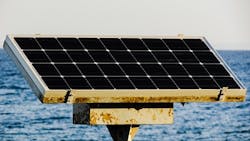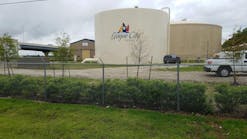HONG KONG SAR – The Water Supplies Department of Hong Kong has commissioned US consultancy Black & Veatch to carry out a feasibility study on floating solar panels on 17 water reservoirs.
Two floating photovoltaic (PV) pilot projects, each 100kW capacity, at Shek Pik and Plover Cove reservoirs (the latter being under construction) will serve as part of the technical evaluation.
Development of large scale floating solar farms could help Hong Kong reduce water loss, suppress algae growth and generate power from renewable resources.
The study will apply a risk-based assessment of installing floating solar farms against significant economic, social and environmental factors, including threats from typhoons. Technology, siting, power capacities, commercial models and resilience of solar farms will be considered.
Enoch Lam Tin Sing, director of water supplies department of the Hong Kong SAR, said: “While there are multiple environmental and economic benefits, this is a complex and innovative approach for Hong Kong, and the study will help identify and understand the potential issues from a sustainability perspective.”
Alan Man, vice president and managing director of Black & Veatch in Hong Kong, said: “Thinking holistically and sustainably – how water, power and all resources are connected – is seeing a wealth of engineering innovation emerge that needs to be properly understood technically and financially. The Water Supplies Department of Hong Kong exemplifies this forward thinking through exploring how it can further secure water supply by reducing evaporation while also creating a new revenue stream by working closely with the electric grid.”
Black & Veatch will combine a team from its water, renewable energy and management consulting businesses.
The company also provided technical support to the UK’s energy regulator’s review of the Renewables Obligation application for the world’s largest floating solar farm, Queen Elizabeth II Reservoir at Walton-on-Thames which was completed for Thames Water in 2016.
###
Read more
Desalination plant to meet 5 percent of Hong Kong’s water demand
SWRO and wastewater redesign to help Hong Kong reduce water reliance on China



